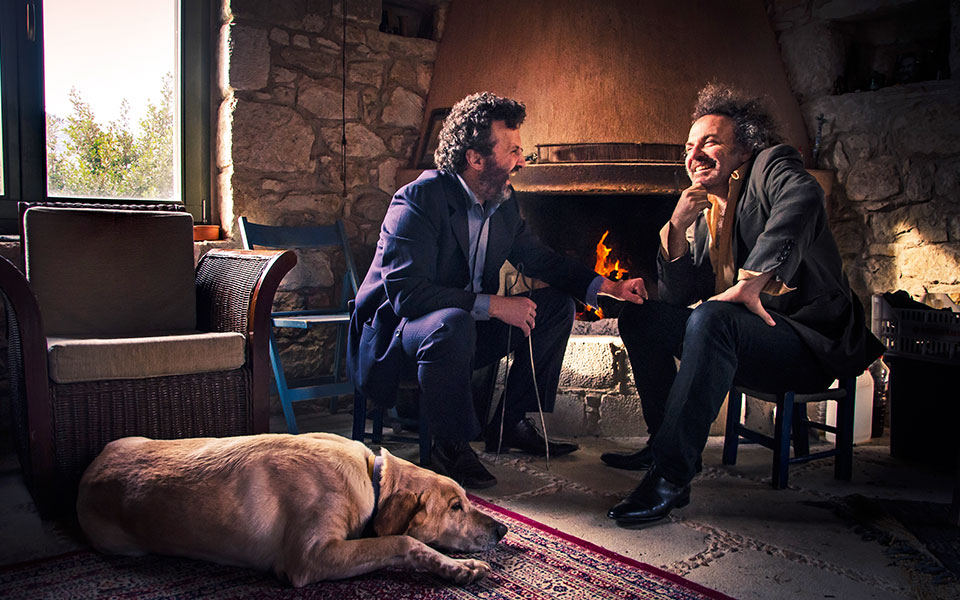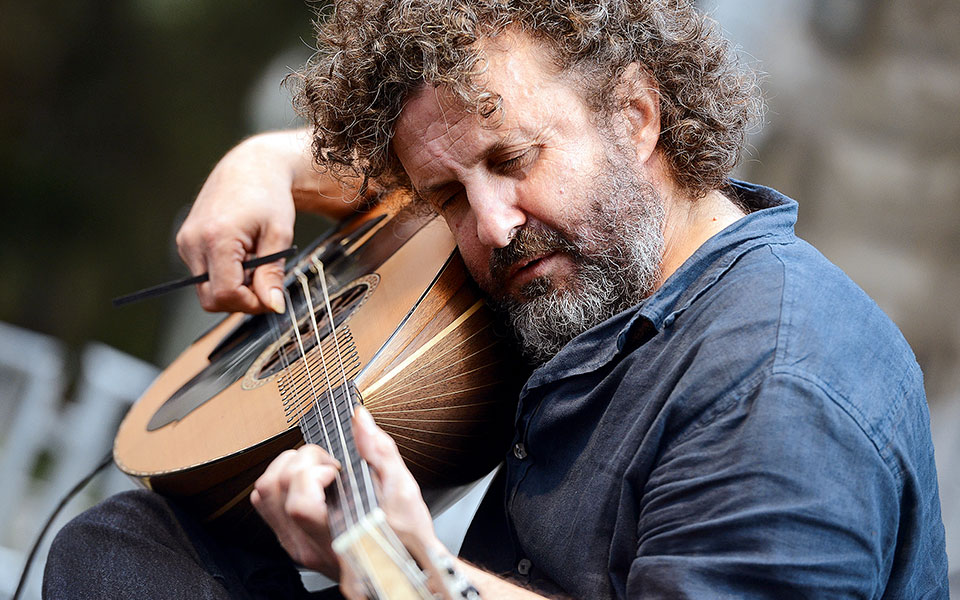A Green Oasis Near Ηania: The Botanical Park...
Where tropical fruit trees thrive beside...

Giorgos Xylouris and his bandmate, Australian drummer Jim White.
© Manolis Mathioudakis
Cretan music is part of the natural world of Crete; it’s like a garden full of colorful wildflowers and heady, aromatic herbs. Our music links us together, and it connects to the past and to the future. It’s something we all share in our everyday lives.
Crete has been a cultural meeting place between East and West since ancient times, and the island’s musicians have embraced instruments and ideas from all of those who came through here, including Venetians, Turks, Arabs, Byzantine Greeks and others.
In general, Cretan music is based on a 4/4 rhythm, unlike on the mainland where it’s often based on compound rhythms such as 7/8 or 9/8. The main instruments are the lyra, the lute, the mandolin and the violin. Inland, where the music has older, deeper roots, they still put bells on the lyra bow and use whistles and the drum called a daouli, as well as bagpipes; these instruments used to be more common all across the island, and today they’re being revived here and there. In more contemporary Cretan music, you’ll find the usual suspects: guitars, bass, drums and other instruments.
Singing is vital to Cretan music, and most traditional tunes have lyrics. Those who don’t understand the words can still feel the landscape and the soul of this place in the rhythm. Traditional music does that − it captures the essence of a place, and all the folk music in the world is related in that it is an expression of a particular people and plays a significant role in their lives.
There is perhaps nothing nicer than tears of joy. Music expresses every emotion, and there is a song for every occasion. Wedding songs, for instance, make me feel happy and sad at the same time. Of course, everyone reacts differently to things, so that which causes one person to feel sad might bring someone else joy, but music will stir their emotions one way or the other. Likewise, some may want to dance, while others may just want to sit and listen. As someone who plays a great deal of music in front of crowds, I see a wide range of reactions to the same song.

© Getty Images/Ideal Image
In Crete, music celebrates life. It’s always there in the joyous moments, not really in times of sadness. When you’re in mourning in Crete, you don’t take part in dances or in music. However, when the official mourning period has ended, a Cretan can’t wait to get out there and sing again about the emotions he feels.
For me, in the village where I was raised, there was music every night. In the winter, I heard it indoors in the cafés; in the summer, the musicians played in the village square. You couldn’t escape it, and as we were growing up, we learned to play different instruments. I started with the mandolin when I was six or seven and later I’d keep rhythm on the lute for my father at home when he was experimenting with songs. When I was around 15, he took me to Irakleio and I played with him in public. He liked me to accompany him on the lute. From then on, I began to study music more closely, and now that’s what I do, as well as performing, of course. I discover new things about the same pieces I have been playing for years, and these discoveries, along with the new songs and dances I learn in villages across the island, give me the strength and inspiration to keep on playing with joy.
With my bandmate Jim White, we’ve been recording and performing under the name Xylouris White since 2013. We don’t play only Cretan music, and even that we don’t play in a strictly traditional manner. I provide the sound of my culture, and the things that I have in my head, and Jim does roughly the same thing, but from a different musical culture. We’re two bodies, one brain. “Half a brain each,” Jim says, and it often feels that way; there’s a natural connection between us that has lasted all these years, and this connection produces the particular sound that is us, no matter what instruments we’re playing.
We’re often categorised as world music, folk music, Cretan music with post-punk influences, Cretan rock music, Free jazz, whatever… We don’t really see ourselves that way. Instead, we just call our music “Goatish.” People seem to like it; we’ve played at many festivals all over the world, including Big Ears, Sydney Festival, Womadelaide, Hardly Strictly Bluegrass Festival and the Winnipeg Folk Festival, just to name a few.
Crete is full of music events year-round, but summer is the richest season. From the middle of June to the end of August, there are official music events all over the island. Be sure to catch one, and you’ll discover a little more about the Cretan spirit.
Where tropical fruit trees thrive beside...
Cretan cuisine lives on from home...
Discover Crete’s iconic sarikopites – delicate...